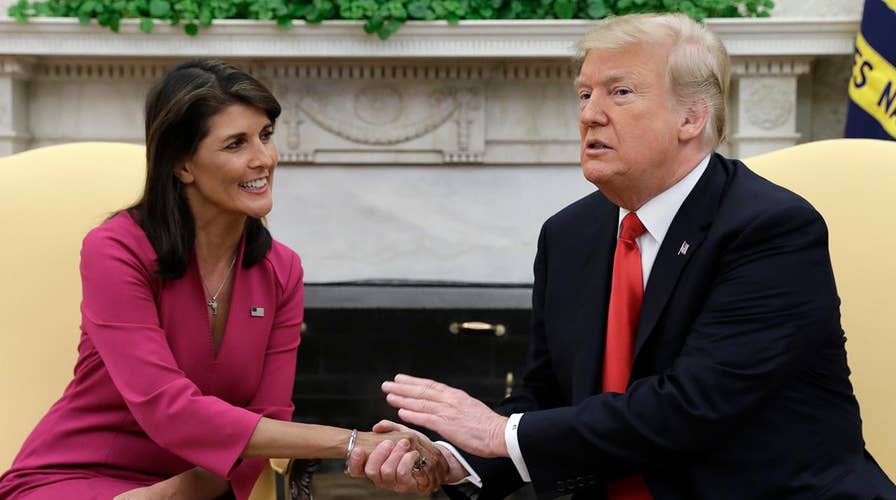Trump praises Amb. Nikki Haley: We will miss you
President Trump makes remarks as United Nations Amb. Nikki Haley submits resignation.
Nikki Haley will be remembered as one of the most aggressive and successful U.S. ambassadors to the United Nations and remains one of the most ambitious and talented Republicans on the national scene.
The former South Carolina governor had little formal foreign policy experience when President Trump selected her for the second-most senior position at the State Department. She leaned toward the politically unpopular pro-interventionist neoconservatives, such as Senator Marco Rubio, whom she endorsed for president over Trump.
But she adapted and thrived rapidly—a process I got to see firsthand as a media advisor on the Trump transition team aiding top State Department nominees, including Haley. That was the beginning of her tenure in the early and most turbulent days of the Trump administration, which saw Haley at the forefront of new policies that reversed Obama administration failures on China, Iran, North Korea, Russia, trade and climate change.
In those early days, it became clear that the talent and magnetism Haley exhibited in South Carolina would translate well to the international stage on behalf of America. Her toughness was obvious and effective. Put simply, Haley likes to fight. In fact, she sometimes smiles when she fights. And she never waited for a permission slip from anyone in Washington to fight—a trait Trump reportedly admired in her and found absent in his first Secretary of State, Rex Tillerson.
Haley didn’t just fight for Trump policies. She brought moral clarity to a United Nations that remains a cesspool of moral equivalence and globalist elitism. Most notably, she pulled the United States out of the Orwellian-named U.N. Human Rights Council, which coddles dictators and fights U.S. allies like Israel.
Within the administration, Haley won broad admiration. Many assumed that Trump had chosen her either to capture a potential opponent within the GOP or to elevate South Carolina lieutenant governor Henry McMaster—an early Trump endorser—to the governor’s mansion. Less cynical observers thought Trump had spotted Haley’s talent and wanted someone in America’s media capital who had star power, rather than one of the usual intellectuals who often serve as U.S. ambassador to the U.N.
There will be much speculation as to why Haley has chosen this moment to leave the administration. As with most analysis in Washington today, these assessments will be corrupted by the media’s insatiable lust to make Trump look bad regardless of fact. They’ll say she’s leaving a sinking ship, privately disdains the president, or doesn’t want to be around if the House begins quixotic attempts to impeach Trump or other officials—an inevitability if radicalized Democrats win that body in elections next month.
My own view is that Haley’s decision reflects well on Trump.
No one can read Haley’s mind, but it’s clear she is ambitious and likely has ambitions for the presidency. Taking the U.N. job gave her necessary national security experience (but enough separation from Washington) if Trump stumbled badly in his first term and was likely to face a Republican primary challenger in 2020—potentially her. But with the roaring Trump economy and a string of successes on trade, the Supreme Court, tax reform, deregulation, and defending America from the progressives’ onslaught of social justice authoritarianism, his reelection prospects are excellent. Certainly, he will face no serious Republican challenger.
Haley’s play for the presidency is 2024 or later, not 2020. In two years at the U.N. where she left a dramatic mark, she has banked the upside of the position. Additional tenure would be of limited use. My guess—and it is only a guess—is that she will head to corporate America to prepare herself financially for a political reemergence down the road.
Trump now faces the decision of whom to replace Haley with at the U.N. The conventional wisdom would be to play it safe with a milder and easily confirmable nominee, especially after the recent hate-filled acrimony of the Kavanaugh confirmation.
But Trump should go with a fighter instead. In fact, he should go with Richard Grenell, his outspoken ambassador to Germany.
Grenell spent the George W. Bush years as a senior figure at the U.S. mission to the U.N. He was the spokesman for all of President Bush’s ambassadors there, including John Bolton, who now serves as Trump’s national security advisor.
In his brief but pivotal tenure as U.S. ambassador to Germany, Grenell has pushed European officials hard on Iran, which they are inclined to appease. In fact, Grenell has done much to defeat an effort by the German, British and French governments to undermine tougher U.S. sanctions on Iran’s oil industry over Tehran’s support for jihadism and its nuclear weapons aspirations. Grenell has quietly put the choice to European companies: do business with America or Iran, not both. To the chagrin of their own unhelpful governments, most major European companies have chosen America, and are curtailing business with Iran.
Trump should let Grenell’s approach to diplomacy and toughness with the media continue with an expanded purview at the U.N. As one of the most prominent gay Republicans, Grenell’s move to New York would also further undermine the progressive lie that Trump is bigoted. He should replace a star with another star.

